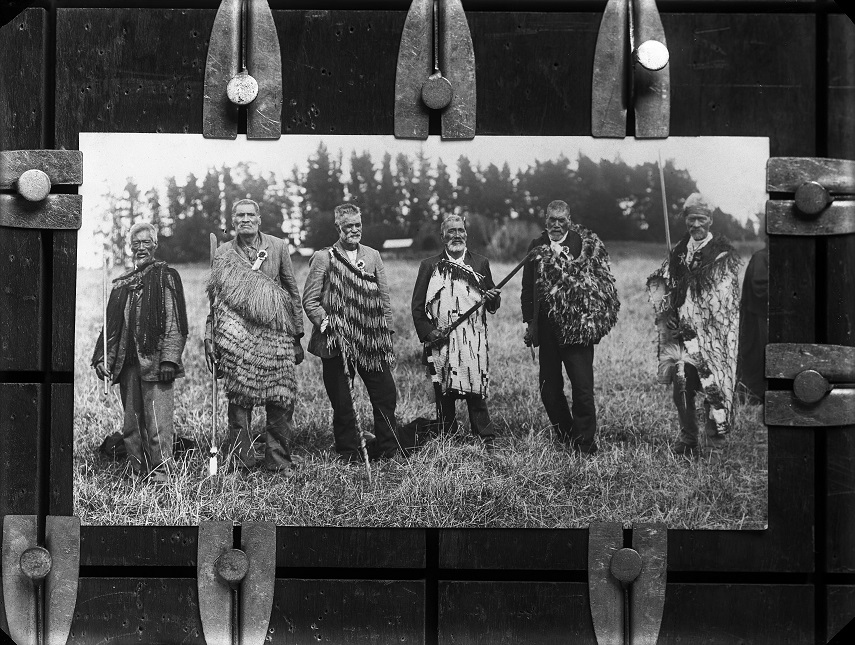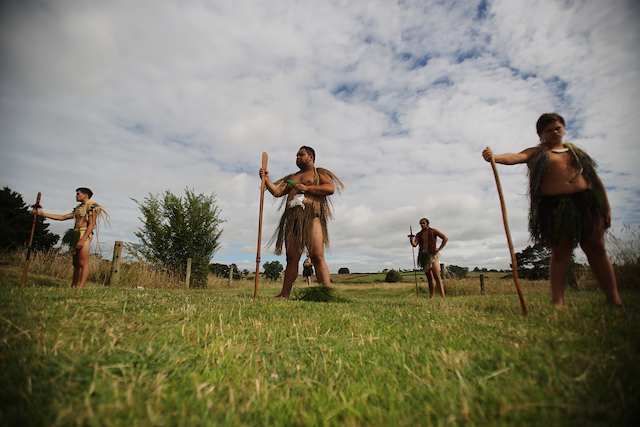2013 marked the beginning of a series of commemorative events to mark the 150th anniversary of the Waikato Land Wars. Te Puni Kōkiri was among a number of government agencies that worked with Waikato-Tainui to mark this significant milestone in our history.
Published: Monday, 1 September 2014 | Rāhina, 01 Mahuru, 2014


Survivors of the 1863 Battle of Ōrākau commemorate the event 50 years later. Photo: Alexander Turnbull Library
Waikato Wars 150th Anniversary
The New Zealand Wars between Māori and Crown forces (the latter including British, colonial and allied Māori troops) played a major role in shaping modern Aotearoa-New Zealand.
The Waikato-Tauranga commemorations of 2013 and 2014, and the themes of reconciliation and transformation formed the back-drop for a collaborative project shared by iwi and government agencies.
Te Puni Kōkiri worked with the Ministry for Culture and Heritage, New Zealand Historic Places Trust, and New Zealand Defence Forces to support the Waikato-Tauranga commemorations.
A coordinating group for the Waikato-Tauranga commemorations representing iwi and communities, Ngā Pae o Maumahara, was formed and received secretariat support from Te Puni Kōkiri.
Te Puni Kōkiri Regional Director, Gail Campbell says: “Re-telling the stories from our dual heritage, and reflecting on each other’s perspectives, creates a dialogue that relates to the process of reconciliation that the Crown and Iwi Māori have embarked upon with much success.”
Six events throughout Waikato and Tauranga were led by iwi onsite co-ordinated by Ngā Pae o Maumahara, and attended by a range of dignitaries along with thousands of iwi and community members.

150th anniversary of the Battle of Waiari.
The year of commemorative activities concluded at Koroneihana, Kīngi Tuheitia’s eighth anniversary of his coronation, in August 2014.
At the Ōrākau commemoration, Treaty Negotiations Minister Finlayson acknowledged the National War Memorial had represented only New Zealanders lost to international conflicts. Suggesting the National War Memorial Park (Pukeahu) development could include recognition of “those who fought and lost their lives in conflicts within New Zealand”.
The commemorations began on 20 November 2013 by remembering the crossing of the Mangatāwhiri Stream 150 years earlier by colonial soldiers, which marked the start of the Te Pakanga o Waikato, and the battle of Rangiriri. In 2014 followed events remembering the battles of Waiari and Rangiaowhia, Ōrākau, Pukehinahina (Gate Pā), and Te Ranga.
Tom Roa, Ngāti Apakura elder and Ngā Pae o Maumahara Chair said: "It is with great sadness that we have recalled these battles. But as New Zealanders, it's important to remember that this journey has brought us all together as we looked back at this significant turning point in the history of our country.
It's given us all the opportunity to reopen the portals and bring our fallen back in spirit and farewell them again 150 years later with the dignity they deserve, soldiers and warriors, Māori and Pākehā. As the chair of Ngā Pae o Maumahara, it has been my privilege to lead all New Zealanders into a new era as we move on guided by 150 years of history. Pai marire ki a tatou katoa!" says Roa.
The Commemorations
Rangiriri, 20 November 2013
On 12 July 1863, under orders from Governor George Grey, British troops marched south from Pōkeno and crossed the Mangatāwhiri stream initiating the conflict; the second Māori King Tāwhiao had erected a pou as a sign-post asserting that south of the pou as Māori territory. Te Pou o Mangatāwhiri was a boundary marker of mana Māori motuhake.
A literal line in the sand was drawn. Over the following months British forces fought their way south towards the Kīngitanga agricultural bases around Rangiaowhia and Te Awamutu. On the way they outflanked formidable modern pā at Meremere and Pāterangi, and captured the pā at Rangiriri.
A breakfast at SkyCity called A Day to Remember complemented a karakia and service at Mangatāwhiri.
Waiari, 11 February 2014

150th anniversary of the Battle of Waiari.
On 11 February 1864, soldiers bathing in the river, part of General Cameron’s invasion force, were surprised by Māori warriors coming from the old pā site. Reinforcements joined the battle and fierce fighting took place.
It was in this action that Charles Heaphy became the first member of any locally raised or colonial military unit in the British Empire to be awarded the Victoria Cross.Between 20 and 40 Māori warriors were killed, and six British troops died.
The Waiari commemoration began with waerea, karakia and haka followed by speeches from both Māori and Crown historians. The precise location of the battle is unmarked and the service took place on the pā site close to where the stoush took place on local farmland. Following the ceremony, guests were welcomed on to Pūrekireki Marae to conclude the day.
Rangiaowhia, 21 February 20140

150th anniversary of the Battle of Rangiaowhia.
One hundred and fifty years since an attack on the village of Rangiaowhia in the Waikato War , the events that unfolded at the small settlement near Te Awamutu are still debated by historians and the descendants of Ngāti Apakura.
At daybreak, the advance guard of General Duncan Cameron’s 1000-strong force of cavalry and foot soldiers attacked the largely undefended Rangiaowhia and its 200 occupants. Twelve Māori were killed, including women, children and the elderly. Several houses were burned down, with villagers incinerated inside. Five British soldiers died. Māori oral histories differ.
To mark this day, the local iwi unveiled a plaque at dawn on the site they believe the houses stood before they were burned down. Later, a silent hīkoi made its way to the Catholic Cemetery and dignitaries joined the hīkoi en route. During the procession, local kuia at significant points along the way led the hīkoi with their karanga, a wailing lament to those whose lives were lost on that tragic day.
Ōrākau, 1 April 2014
One of the most well-known battles of the New Zealand Wars, it took place between 31 March and 2 April 1864.

150th anniversary of the Battle of Ōrākau.
In April 1864 Kīngitanga warriors under Rewi Maniapoto were heavily defeated at Ōrākau in the last battle in Waikato.
By mid-1864, 400,000 hectares of Waikato land had passed under Crown control. This event was to be the inspiration for the New Zealand film taonga ‘Rewi’s Last Stand’.
Waikato, Raukawa and Maniapoto Iwi hosted a special ceremony close to the site where the battle took place, south-east of Kihikihi.
A flag raising ceremony and karakia began at dawn. At the first pōwhiri, Waikato, Raukawa and Maniapoto welcomed iwi from around the motu. Later, a second official welcome, including a 200-strong haka rōpū, greeted local and central government representatives. Following addresses from Prime Minister John Key, the Governor-General Lt Gen The Rt Hon Sir Jerry Mateparae, and Minister Finlayson, a plaque was unveiled and blessed by a New Zealand Defence Force memorial service. The ceremony concluded with a procession of parekawakawa (wreaths) and laying of wreaths in memory of those who died in the battle.
Pukehinahina (Gate Pā), 29 April 2014
The150th anniversary of the Battle of Gate Pā (Pukehinahina) was commemorated at Tauranga. The battle was notable as one of the heaviest British defeats of the New Zealand Wars. Thirty-one colonial troops died at Gate Pā, while the number of Māori warriors killed is estimated at 20.
Notably, Hēnare Taratoa, a Christian minister, wrote a code of conduct for the battle, imploring that the enemy be cared for and not ill-treated when wounded.
Gate Pā events began with a dawn blessing at the Gate Pā Reserve. A full military service was held at the Mission/Otamataha Cemetery, and at noon a pōwhiri welcomed the Māori King, visiting iwi and dignitaries. The day finished with a commemoration march, wero, reconciliation service and ceremony.
Te Ranga, 21 June 2014.
The imperial soldiers’ revenge for Gate Pā came a few weeks later, on 21 June 1864 at Te Ranga. While the defenders were building a new fortification, they were attacked and many were killed. In Māori terms this was considered a treacherous act, as great kindness was shown the British wounded at Gate Pā.
At the last engagement of Te Pakanga o Waikato, Tauranga Māori were finally defeated at the battle of Te Ranga on 21 June 1864.
Anniversary opportunities
“Post-settlement, the 150th anniversary provides an opportunity to inform and educate all New Zealanders in an environment of reconciliation and redevelopment rather than grievance,” says Gail Campbell.
“We know that our rangatahi want to know their dual heritage and shared stories – the petition presented by Otorohanga College students at Ōrākau signalled that. From our experience this past year with other agencies and Waikato-Tauranga iwi, and as we look towards the 175th anniversary of the Treaty of Waitangi signing, we can enjoy a renewed spirit of partnership.”
Up to 3000 people died during the New Zealand Wars – the majority of them Māori. And for many Māori the wars were only a prelude to the loss of their land through confiscation or the operations of the Native Land Court.
The road to reconciliation and transformation
This loss of land had particularly devastating economic, social, environmental and cultural consequences for Waikato-Tainui.
Since the 1990s, the Crown has negotiated Treaty Settlements to redress the historical grievances in the Waikato region and New Zealand as a whole.
In 1995 the first major settlement of an historical confiscation, or raupatu, claim was agreed between the Crown and Waikato-Tainui. The claim was settled for a package worth $170 million, in a mixture of money and Crown-owned land.
The settlement was accompanied by a formal apology, delivered by Queen Elizabeth II in person during her 1995 visit to New Zealand. The Crown apologised for the invasion of the Waikato and the subsequent indiscriminate confiscation of land.
The 150th anniversary of the Waikato War was identified as the ‘major’ anniversary for 2013 in the prioritised list of anniversaries 2011-2016 approved by Cabinet in 2010. Local communities organised commemorative activities for the 150th anniversaries in 2013-14 of the campaigns in Waikato and Tauranga.
Other New Zealand Wars anniversaries 2013-2023 include:
- 150th of fighting between Pai Mārire adherents and Crown forces: 2014-2016
- 150th of fighting between the forces of Tītokowaru and the Crown: 2018-2019
- 150th of fighting associated with the pursuit of Te Kooti: 2018-2022
- 175th of the Northern War: 2020-2021
- 175th of the war in Wellington and Whanganui: 2021-2023